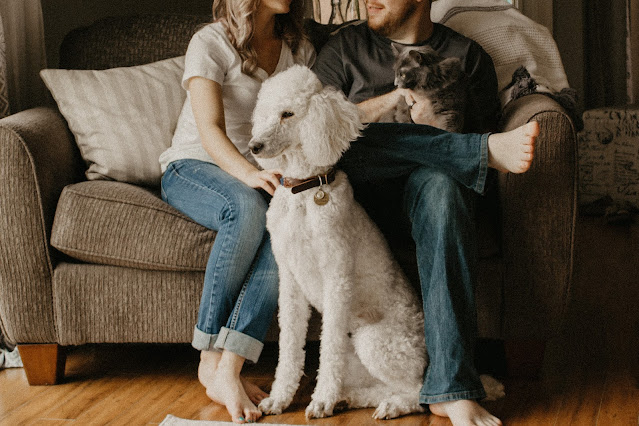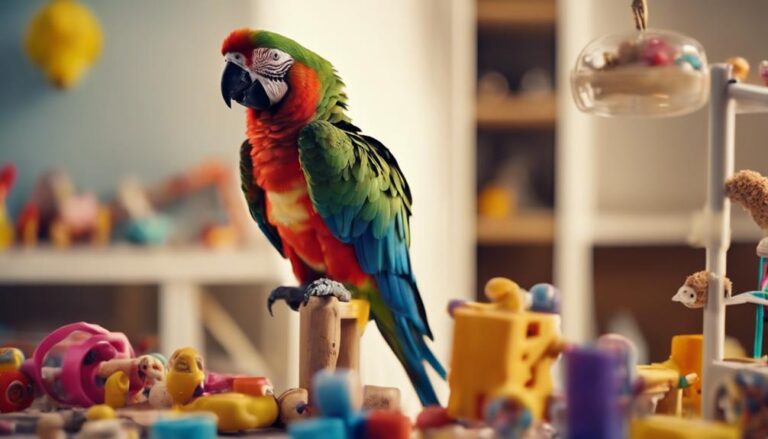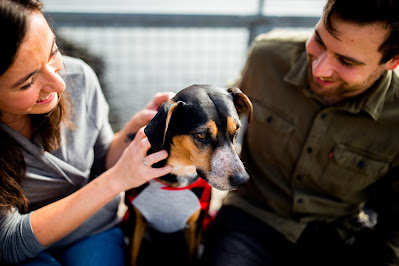What Happens When Pets Come Between Partners Guidance

What Happens When Pets Come Between Partners: Have you ever considered the impact that pets can have on romantic relationships? It turns out that navigating love can become quite complicated when furry companions come between partners. From conflicting emotions and communication challenges to financial strains and jealousy, various factors can strain a relationship when pets are involved.
However, fear not! In this discussion, we will delve into the intricacies of this topic, exploring the role of pets in relationships, the challenges they can pose, and potential strategies for finding harmony between partners and their beloved pets. So, whether you’re a pet owner or simply curious about the dynamics of pet-inclusive relationships, keep reading to gain insight into what happens when pets come between partners.
The Role of Pets in Relationships
The role of pets in relationships is pivotal, as they bring joy, and companionship, and can even serve as a barometer for compatibility between partners. Pets have a unique ability to provide unconditional love and emotional support, making them valuable members of our families. When it comes to relationships, they can play a crucial role in determining the compatibility and overall happiness of a couple.
Having a pet can bring immense joy and create a sense of shared responsibility and companionship between partners. The love and affection a pet provides can help strengthen the bond between you and your partner. Pets can also serve as a source of comfort during difficult times, offering a listening ear and a warm presence when needed. Their playful nature and ability to bring laughter into our lives can contribute to a positive atmosphere in the relationship.
Furthermore, the relationship between your pet and your partner can reveal important insights about your partner’s attitude and compassion. Observing how your partner interacts with your pet can give you a glimpse into their character and how they treat others. If your partner shows kindness, patience, and respect towards your pet, it is likely an indication of their ability to be empathetic and nurturing in the relationship.
On the other hand, clashes between your pet and your partner can be a cause for concern. Incompatibility between them can lead to tension and strain on the relationship. It is crucial to address any conflicts or issues that arise and find a compromise that ensures the well-being of both your pet and your relationship. Communication is key in resolving these conflicts, as open and honest discussions can help identify any underlying problems and work towards a solution that satisfies all parties involved.
Conflicting Emotions and Pet Ownership
It’s natural to feel conflicted when it comes to pet ownership and your relationship. Pet custody battles can arise when couples separate, forcing you to choose between your beloved pet and your partner. Emotional attachment challenges can also arise, as you may find it difficult to balance your love for your pet with the needs of your partner. It’s important to navigate these conflicting emotions with empathy, open communication, and a willingness to compromise for the well-being of everyone involved.
Pet Custody Battles
When navigating the emotional complexities of pet custody battles, it can be challenging to balance conflicting emotions and ensure the well-being of your beloved furry family member. Pets hold a special place in our hearts, and when relationships come to an end, deciding who gets custody of the pet can be heartbreaking. It’s important to approach this situation with empathy and practicality.
First and foremost, remember that the well-being of your pet should be the top priority. Consider what living arrangement would be best for them and try to reach a compromise with your partner. If a compromise cannot be reached, seeking professional help, such as mediation or counseling, can assist in finding a resolution. Remember, the goal is to create a harmonious environment for everyone involved, including your beloved pet.
Choosing Between Partners
Navigating conflicting emotions and pet ownership in relationships can be a challenging journey, requiring empathy, understanding, and practical decision-making. When it comes to choosing between partners, it’s essential to consider the impact on your pet. Introducing your pet to a new partner takes time and patience. Allow them to get to know each other gradually, in a controlled environment.
Set boundaries and rules for both your pet and your partner to follow, creating a harmonious dynamic. It’s also crucial to address any allergies or health concerns related to your pet with your partner. Open and honest communication is key. If conflicts persist or escalate, seeking professional help can provide guidance and support. Remember, finding the right balance between your pet and your partner takes time, but with understanding and compromise, it’s possible to create a loving and harmonious home for all.
Emotional Attachment Challenges
Dealing with conflicting emotions and pet ownership can be a challenging journey, requiring empathy, understanding, and practical decision-making. When pets come between partners, emotional attachment challenges may arise, putting strain on the relationship. Different pet parenting styles and the financial responsibilities associated with pet ownership can lead to disagreements and even resentment.
It is essential to have open communication and mutual understanding to resolve conflicts related to pet ownership. Taking the time to listen to each other’s perspectives and finding ways to compromise can help navigate these challenges. Seeking professional help, such as couples counseling or therapy, can also provide guidance in addressing underlying relationship issues. Remember, maintaining a balanced approach to sharing responsibilities and managing the impact of pet ownership is crucial for a healthy and harmonious relationship.
Communication Challenges and Pet Preferences
When it comes to pets, communication challenges and differing pet preferences can create tension in a relationship. Misunderstandings over pet care can lead to conflicts and hurt feelings. It’s important to have open and honest conversations about pet-related issues, finding compromises that work for both partners, and respecting each other’s choices.
Pet-Related Relationship Conflicts
Finding a balance between your pet’s needs and your partner’s preferences can be a challenging but necessary aspect of maintaining a harmonious relationship. When introducing a new pet into your life, it’s important to be aware that conflicts may arise. Your partner may have allergies, fear, or simply not share the same love for pets as you do.
These differences can cause problems and strain the relationship. It’s crucial to communicate openly and honestly about your expectations and concerns. Seek compromises that consider both your pet’s well-being and your partner’s comfort. Establishing clear boundaries and rules is essential in creating harmony. If conflicts persist, consider seeking professional help from animal behaviorists or couples counseling to navigate these challenges together. Remember, finding common ground is key to maintaining a healthy and loving relationship.
Misunderstandings Over Pet Care
Navigating misunderstandings over pet care can be a source of conflict and stress in relationships. When it comes to getting a pet, it’s important to consider how it might impact your relationship dynamic. Communication challenges regarding pet preferences can strain the relationship, as differing attitudes toward pet care can reveal underlying compatibility issues.
It’s crucial to establish clear boundaries and rules for pet care to ensure harmonious coexistence. Take the time to discuss your expectations and concerns openly with your partner. Try to find common ground and compromise on matters such as feeding, grooming, and training. However, if conflicts over pet care persist, seeking professional help may be necessary. Remember, understanding and respecting each other’s perspectives can go a long way in resolving misunderstandings and building a stronger bond.
Compromising on Pet Choices
Understanding and respecting each other’s preferences when it comes to pet choices can be a key aspect of navigating the challenges of communication and maintaining harmony in a relationship. It’s important to acknowledge that both you and your partner may have different ideas about the type of pet you want to bring into your lives. To find a compromise, you can start by openly discussing your pet’s preferences and needs. Listen to each other’s reasons and try to understand the underlying motivations. Positive reinforcement can be a helpful tool in encouraging compromising behaviors.
It’s also crucial to set clear boundaries and rules for both your pet and your partner and consistently reinforce them. If conflicts persist, seeking professional help from animal behaviorists or trainers can provide valuable guidance. Remember to view pet care as a partnership and establish a pet schedule to divide responsibilities equally. By compromising and finding common ground, you can ensure that both you and your partner feel heard and respected in your pet choices.
Financial Strains and Pet Care Responsibilities
Discussing and planning the financial responsibilities of pet care with your partner is crucial for maintaining a harmonious relationship. Financial strains related to pet care responsibilities can often become a source of conflict between partners. However, with open communication and careful planning, you can navigate these challenges together.
One practical step you can take is to set a pet budget. By identifying the expenses associated with your furry friend, you can better understand the financial strains involved. Consider the costs of food, grooming, veterinary care, and any other necessary supplies. Once you have a clear picture of the expenses, you can work together to allocate funds and ensure that both partners contribute their fair share.
It’s also important to explore ways to reduce or share the financial burdens. For example, you could research cost-effective options for pet supplies or consider switching to a more affordable brand of pet food. Additionally, hiring a dog walker or using pet care assistance apps can provide some relief, especially if both partners have busy schedules.
Open and honest communication about the financial aspects of pet care is essential. Discuss your expectations, financial limitations, and any concerns you may have. By addressing these topics early on, you can prevent misunderstandings and potential conflicts in the future.
Jealousy and Resentment Towards Pets
Feeling jealous or resentful towards your partner’s pets is a common challenge that can strain your relationship if not addressed and managed effectively. It’s completely understandable to feel this way, as pets often receive a great deal of attention and affection from your partner. However, it is important to remember that these feelings of jealousy and resentment towards pets can be detrimental to your relationship if left unaddressed.
Open communication is crucial in navigating these emotions and finding a balance in your relationship. Talk to your partner about how you are feeling and be honest about your concerns. It’s possible that your partner may not even realize the impact their pet is having on you. By expressing your feelings, you allow both yourself and your partner to work together to find a solution.
Small adjustments in routines and attention allocation can go a long way in alleviating feelings of jealousy and resentment. Discuss with your partner how you can both create a schedule that allows for quality time together, while also ensuring that the needs of the pet are met. This way, you can both feel valued and prioritized in the relationship.
If the feelings of jealousy and resentment persist and begin to affect your relationship negatively, seeking professional help or counseling may be beneficial. A professional can provide guidance and support in resolving the underlying issues related to jealousy and resentment towards pets.
Compromising on Pet-related Decisions
When it comes to navigating the challenges of feeling jealous or resentful towards your partner’s pets, finding compromises on pet-related decisions is essential for maintaining a healthy and balanced relationship. It’s important to remember that your partner’s furry friend was there before you, and they hold a special place in their heart. So, instead of letting pet-related conflicts escalate, consider finding common ground and compromising on these issues.
One way to find a compromise is by establishing clear boundaries and rules for both your pet and partner to follow. This can help ensure that everyone’s needs are met and that there is a harmonious balance in the household. For example, you can discuss and agree upon designated areas where the dog can sleep or spend time, so that both you and your partner feel comfortable and respected.
If conflicts persist or escalate, it may be helpful to seek professional help. A dog trainer or behaviorist can provide guidance and support in addressing any issues that arise between your pet and your partner. They can help you understand the underlying causes of the conflicts and provide strategies to manage them effectively.
In addition, it’s important to introduce your pet to your new partner gradually and in a controlled environment. This can help your pet feel more comfortable and reduce any potential anxiety or territorial behavior. It’s also crucial to discuss any allergies or health concerns related to your pet with your partner so that they are aware and can take necessary precautions.
Lastly, consider enlisting the help of a dog walker or pet sitter to ensure that your pet’s needs for exercise and companionship are met. This can help alleviate any burdens or responsibilities that may be causing tension between you and your partner.
Navigating Different Approaches to Pet Discipline
To effectively navigate different approaches to pet discipline, it is crucial to establish clear and consistent guidelines that both you and your partner can follow. When it comes to disciplining your furry friend, it’s important to remember that consistency is key. Discuss and agree on pet rules and routines as a couple, ensuring that you are on the same page when it comes to enforcing discipline.
Teaching your pet where they can and can’t roam is an essential aspect of pet discipline. Create boundaries within your home by designating certain areas as pet-free zones. This not only helps maintain order and cleanliness in your living space but also establishes clear expectations for your pet.
Stick to a consistent plan for discipline. Whether it’s using positive reinforcement or timeouts, it’s important to find an approach that works for both you and your partner. By being consistent in your methods, your pet will learn what is expected of them and will be less likely to engage in unwanted behaviors.
Remember that navigating different approaches to pet discipline requires patience and understanding. It is normal for couples to have different opinions and ideas about how to discipline their pet. Take the time to listen to each other’s perspectives and find a middle ground that both of you can agree on.
In the long run, the benefits of a well-behaved pet are worth the effort. A disciplined pet creates a harmonious environment, reduces stress, and fosters a positive relationship between you and your partner. By working together and establishing clear guidelines, you can navigate different approaches to pet discipline and enjoy the companionship of a well-behaved furry friend.
For more tips on pet discipline and other health-related topics, visit our website at [site_url:/lifestyles/health]. Stay up-to-date with the latest information and make informed decisions about your pet’s well-being.
Balancing Quality Time With Partners and Pets
Finding a healthy balance between quality time spent with your partner and your beloved pets can be a rewarding and fulfilling endeavor. It is important to acknowledge that both your partner and your pet require time and attention to feel loved and valued. To achieve this balance, it is crucial to establish clear boundaries and rules for both your pet and your partner. Open communication is key in understanding and meeting your pet’s needs while ensuring that your partner feels included and valued in the relationship.
When introducing your pet to your partner, take it slow and create a controlled environment that promotes positive associations. Give your pet and partner the opportunity to get to know each other gradually, allowing them to build trust and familiarity. This will help foster a harmonious bond between them and reduce any potential conflicts.
It is also essential to discuss any allergies or health concerns related to your pet with your partner. Explore alternative solutions or compromises that can ensure the well-being of both your partner and your furry friend. By being proactive and addressing these concerns early on, you can prevent any future complications and maintain a healthy environment for everyone involved.
If conflicts persist or escalate between your pet and your partner, seek professional help. Consulting a pet behaviorist or a couples therapist who specializes in pet-related issues can provide valuable guidance and support. Remember, seeking help is a proactive step towards creating a harmonious environment for both your partner and your pet.
Establishing consistent pet discipline is another crucial aspect of balancing quality time with your partner and your pet. As a couple, agree on pet rules and routines to ensure that your pet is well-behaved and respectful of both you and your partner. Enjoying the benefits of a well-disciplined pet will contribute to a more peaceful and enjoyable relationship for all.
Seeking Professional Help for Relationship Issues Caused by Pets
Are you struggling to resolve relationship issues caused by your pets? It can be a challenging situation to navigate when the furry members of your family start to come between you and your partner. The good news is that there are professional resources available to help you work through these difficulties and strengthen your relationship. Seeking professional help for relationship issues caused by pets can provide you with the guidance and support you need to find a resolution that works for everyone involved.
One option to consider is couples therapy. A licensed therapist who specializes in relationship dynamics can help you and your partner explore the underlying issues that are being triggered by your pets. They can provide a safe space for open communication, helping you to express your concerns and frustrations constructively. Through counseling, you can gain a better understanding of each other’s needs and find ways to compromise.
Another resource to consider is individual therapy. Sometimes, the issues caused by pets may be rooted in deeper emotional or psychological challenges. A therapist can help you explore these underlying factors and develop strategies for managing them effectively. They can also provide guidance on setting boundaries and establishing healthy routines that prioritize both your relationship and your pets’ well-being.
In addition to therapy, there are also online resources and support groups available. These platforms can connect you with others who are experiencing similar challenges and offer advice, tips, and encouragement. They can be a valuable source of support and reassurance, reminding you that you are not alone in your struggles.
What Happens When Pets Come Between Partners Frequently Asked Questions
Do Pets Bring Couples Closer Together?
Pets can definitely bring couples closer together. They provide companionship, reduce stress, and promote emotional connection. In couples counseling, pet therapy can be beneficial. Conflicts over pet ownership can be resolved through open communication and compromise.
How Do Pets Affect Relationships?
Pets can have a significant impact on relationships. They bring joy, but also challenges. Communication is key in navigating pet ownership. Address conflicts, set boundaries, and seek professional help if needed. Remember, love and understanding can overcome any obstacle.
What Happens to Pets When Couples Break Up?
When couples break up, pet custody can become a sensitive issue. It’s important to consider the well-being of the pet and find a solution that works for both parties. Emotional support animals may require special arrangements.
Can a Pet Save a Relationship?
Pets can play a significant role in healing relationships and can be a valuable asset in relationship therapy. Their unconditional love and presence can provide comfort, support, and a shared focus, helping partners to reconnect and rebuild their bond.
Conclusion
In the complex world of relationships, pets can sometimes create unexpected challenges. However, by approaching these situations with empathy, understanding, and open communication, it is possible to find a balance that allows both partners and pets to thrive. Remember to prioritize compassion and compatibility when considering pet-partner compatibility and seek professional help if needed. With patience and compromise, love can navigate the obstacles that pets may bring and create a harmonious environment for everyone involved.








